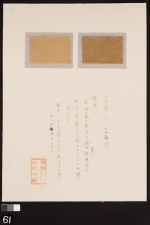Difference between revisions of "Harikawa (Japanese Alder) - right (61 R)"
Jump to navigation
Jump to search
(username removed) |
(username removed) |
||
| Line 5: | Line 5: | ||
| 61 | | 61 | ||
|- | |- | ||
| − | ! scope="row"| | + | ! scope="row"|Uemura number / title |
| − | | | + | | ; "Haze-some 25" |
|- | |- | ||
! scope="row"|Folder location | ! scope="row"|Folder location | ||
| Line 44: | Line 44: | ||
| - | | - | ||
|- | |- | ||
| − | ! scope="row"| | + | ! scope="row"|Uemura's notes |
| The resultant color was pale. The fabric would eventually become black if the process was repeated many times. | | The resultant color was pale. The fabric would eventually become black if the process was repeated many times. | ||
|- | |- | ||
| − | ! scope="row"| | + | ! scope="row"|Uemura's date |
| Kyoto | | Kyoto | ||
|} | |} | ||
| − | [[Category: | + | [[Category:Uemura dye archive]] |
Revision as of 06:16, 24 July 2013
| Museum number | 61 |
|---|---|
| Uemura number / title | ; "Haze-some 25" |
| Folder location | 1st shelf |
| Sample location | right (61 R) |
| Fiber type | cotton |
| Color | light ochre |
| Dyestuff (Japanese common name) | 榛皮 : Harikawa |
| Dye (English common name) | Japanese Alder |
| Dyestuff (botanical name) | Alnus japonica (Thunb.) Steud |
| Plant part | bark /dried (?) |
| Dyestuff extraction | boiled in water |
| Auxiliary agent in dye bath | - |
| Mordant | iron (less quantity) |
| Other auxiliary agent | - |
| Uemura's notes | The resultant color was pale. The fabric would eventually become black if the process was repeated many times. |
| Uemura's date | Kyoto |
